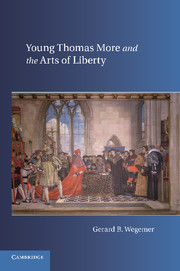Book contents
- Frontmatter
- Contents
- List of Illustrations
- Acknowledgments
- List of Abbreviations
- 1 Young Thomas More
- 2 Fashioning Peace and Prosperity
- 3 Cicero's and More's First Citizens
- 4 More's Earliest Views of Humanitas, Libertas, and Respublica, 1500–1506
- 5 More's Life of Pico della Mirandola (c. 1504–1507)
- 6 More's 1509 Coronation Ode
- 7 Political Poems of 1509–1516
- 8 Richard III
- 9 Utopia
- 10 The Un-Utopian Thomas More Family Portrait
- 11 The Arts of Liberty
- Works Cited
- Index
3 - Cicero's and More's First Citizens
How Do They Avoid Faction and Civil War?
Published online by Cambridge University Press: 25 October 2011
- Frontmatter
- Contents
- List of Illustrations
- Acknowledgments
- List of Abbreviations
- 1 Young Thomas More
- 2 Fashioning Peace and Prosperity
- 3 Cicero's and More's First Citizens
- 4 More's Earliest Views of Humanitas, Libertas, and Respublica, 1500–1506
- 5 More's Life of Pico della Mirandola (c. 1504–1507)
- 6 More's 1509 Coronation Ode
- 7 Political Poems of 1509–1516
- 8 Richard III
- 9 Utopia
- 10 The Un-Utopian Thomas More Family Portrait
- 11 The Arts of Liberty
- Works Cited
- Index
Summary
[I]n a matter affecting the state, I could not but mark the inspired words in the writings of my master Plato: “As are the first citizens [principes] in a commonwealth, so are the other citizens apt to be.” [W]e should all have as our one aim and object what I have so repeatedly urged – the maintenance of peace with dignity.
Cicero, Epistulae ad Familiares 1.12, 21 (emphasis added)In every free nation, and most of all in cities which have attained the enjoyment of peace and tranquility, this one art [of speaking] has always flourished above the rest and ever reigned supreme. … [W]hat other force could have been strong enough either to gather scattered humanity into one place, or to lead it out of its brutish existence in the wilderness up to our present condition of civilization as men and as citizens, or, after the establishment of social communities, to give shape to laws, tribunals, and civic rights?
Cicero, De Oratore 1.30, 33Young Thomas More began his literary career – as would Shakespeare in his first four plays – with a probing study of England's civil wars. Faced with generations of such wars and aware of the people's growing discontent with tyrannous Henry VII, what did this brilliant, well-educated Londoner see as possible solutions to England's internal warfare? He studied carefully the writings and experiences of ancient Athens and the Roman Republic, as well as the institutions and practices of his own self-governing and relatively peaceful city of London.
- Type
- Chapter
- Information
- Young Thomas More and the Arts of Liberty , pp. 35 - 52Publisher: Cambridge University PressPrint publication year: 2011

